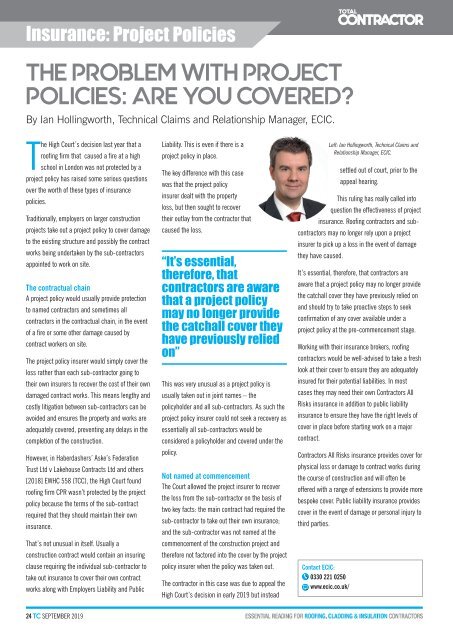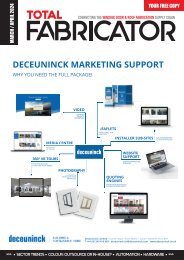September 2019
You also want an ePaper? Increase the reach of your titles
YUMPU automatically turns print PDFs into web optimized ePapers that Google loves.
Insurance: Project Policies<br />
THE PROBLEM WITH PROJECT<br />
POLICIES: ARE YOU COVERED?<br />
By Ian Hollingworth, Technical Claims and Relationship Manager, ECIC.<br />
The High Court’s decision last year that a<br />
roofing firm that caused a fire at a high<br />
school in London was not protected by a<br />
project policy has raised some serious questions<br />
over the worth of these types of insurance<br />
policies.<br />
Traditionally, employers on larger construction<br />
projects take out a project policy to cover damage<br />
to the existing structure and possibly the contract<br />
works being undertaken by the sub-contractors<br />
appointed to work on site.<br />
The contractual chain<br />
A project policy would usually provide protection<br />
to named contractors and sometimes all<br />
contractors in the contractual chain, in the event<br />
of a fire or some other damage caused by<br />
contract workers on site.<br />
The project policy insurer would simply cover the<br />
loss rather than each sub-contractor going to<br />
their own insurers to recover the cost of their own<br />
damaged contract works. This means lengthy and<br />
costly litigation between sub-contractors can be<br />
avoided and ensures the property and works are<br />
adequately covered, preventing any delays in the<br />
completion of the construction.<br />
However, in Haberdashers’ Aske’s Federation<br />
Trust Ltd v Lakehouse Contracts Ltd and others<br />
[2018] EWHC 558 (TCC), the High Court found<br />
roofing firm CPR wasn’t protected by the project<br />
policy because the terms of the sub-contract<br />
required that they should maintain their own<br />
insurance.<br />
That’s not unusual in itself. Usually a<br />
construction contract would contain an insuring<br />
clause requiring the individual sub-contractor to<br />
take out insurance to cover their own contract<br />
works along with Employers Liability and Public<br />
Liability. This is even if there is a<br />
project policy in place.<br />
The key difference with this case<br />
was that the project policy<br />
insurer dealt with the property<br />
loss, but then sought to recover<br />
their outlay from the contractor that<br />
caused the loss.<br />
“It’s essential,<br />
therefore, that<br />
contractors are aware<br />
that a project policy<br />
may no longer provide<br />
the catchall cover they<br />
have previously relied<br />
on”<br />
This was very unusual as a project policy is<br />
usually taken out in joint names – the<br />
policyholder and all sub-contractors. As such the<br />
project policy insurer could not seek a recovery as<br />
essentially all sub-contractors would be<br />
considered a policyholder and covered under the<br />
policy.<br />
Not named at commencement<br />
The Court allowed the project insurer to recover<br />
the loss from the sub-contractor on the basis of<br />
two key facts: the main contract had required the<br />
sub-contractor to take out their own insurance;<br />
and the sub-contractor was not named at the<br />
commencement of the construction project and<br />
therefore not factored into the cover by the project<br />
policy insurer when the policy was taken out.<br />
The contractor in this case was due to appeal the<br />
High Court’s decision in early <strong>2019</strong> but instead<br />
Left: Ian Hollingworth, Technical Claims and<br />
Relationship Manager, ECIC.<br />
settled out of court, prior to the<br />
appeal hearing.<br />
This ruling has really called into<br />
question the effectiveness of project<br />
insurance. Roofing contractors and subcontractors<br />
may no longer rely upon a project<br />
insurer to pick up a loss in the event of damage<br />
they have caused.<br />
It’s essential, therefore, that contractors are<br />
aware that a project policy may no longer provide<br />
the catchall cover they have previously relied on<br />
and should try to take proactive steps to seek<br />
confirmation of any cover available under a<br />
project policy at the pre-commencement stage.<br />
Working with their insurance brokers, roofing<br />
contractors would be well-advised to take a fresh<br />
look at their cover to ensure they are adequately<br />
insured for their potential liabilities. In most<br />
cases they may need their own Contractors All<br />
Risks insurance in addition to public liability<br />
insurance to ensure they have the right levels of<br />
cover in place before starting work on a major<br />
contract.<br />
Contractors All Risks insurance provides cover for<br />
physical loss or damage to contract works during<br />
the course of construction and will often be<br />
offered with a range of extensions to provide more<br />
bespoke cover. Public liability insurance provides<br />
cover in the event of damage or personal injury to<br />
third parties.<br />
Contact ECIC:<br />
0330 221 0250<br />
www.ecic.co.uk/<br />
24 TC SEPTEMBER <strong>2019</strong>

















